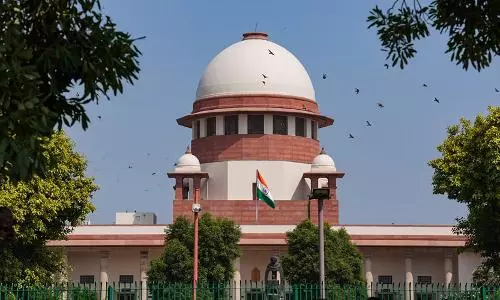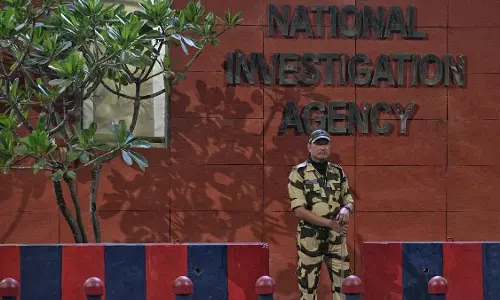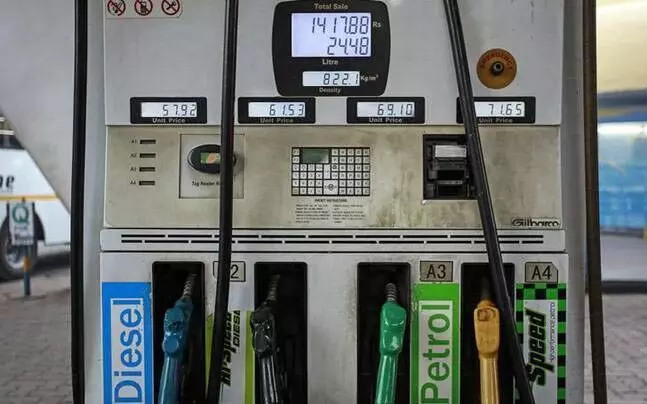
Is the Centre indeed so helpless?
text_fieldsIt must be the first time in the history of independent India that the Central Government has taken a stand that nothing can be done on an issue that plunges the public into hardship. As fuel prices soar, affecting daily life, the Prime Minister blames previous governments; the Finance Minister feigns helplessness. Speaking at the online inauguration of an oil and gas projects in Tamil Nadu, Narendra Modi said, "I do not want to criticise anyone, but I want to say (that) had we focused on this subject [dependence on import] much earlier, our middle-class would not be burdened," As for the finance minister, during a discussion on the Union Budget in Chennai, Nirmala Sitharaman betrayed the suffering people, saying that the fuel price issue was a vexatious issue and a "huge moral dilemma" and could not be resolved immediately. While the prime minister's excuse is the lack of self-sufficiency in energy, the finance minister's is the complexities of pricing. Either way, it turns out that there is no resolution being offered to help the citizens. It is not any official or lower level minister who says this, but the Prime Minister and Finance Minister. Then who will people complain to now? Did the promise of 'Achhe din' mean that we have nothing to do with suffering? Is good governance a name for passively watching people suffer?
It seems as though the Finance Minister is now realizing that petrol and diesel are not subject to the Goods and Services Tax (GST). The government breached two promises made to the public regarding fuel price hike; one was the promise given to the people when the cost determination of fuel was left to the fuel companies. When the government stopped controlling prices and left it to the market powers, the government said that the companies would set the price, and consumers would benefit when prices fell in the international market. When prices actually fell in the global market, the same government denied people the benefits of it by increasing taxes. The second breach of promise was made by excluding fuel prices from GST. When GST was introduced with the motto of 'One Nation, One Tax', it can only be intentional that the one commodity that affects everyone wide and deep was kept out of the list. This is what the Finance Minister now brings up as an excuse. When she says to the effect that it will take the GST council to convene and discuss it, it simply means the government is not planning to fix it anytime soon.
More strange is the Prime Minister placing the blame for the current price hike on 'previous governments', which ended seven years ago. Domestic production in fuel sector is undoubtedly important. However, doesn't the inactivity of the PM who was aware of this in the last seven years have any role in the current crisis? The people gave Modi a mandate in 2014, placing trust in the campaign by Narendra Modi towards the end UPA's term, against the fuel price hike. They believed him when he blamed the Manmohan Singh government's corruption and misrule for the hike in fuel prices. Now even two years into the second term of Modi, things have only gotworse. We still import over 85% of crude oil and over 53% of natural gas. Fuel prices have skyrocketed in the past seven years. Whose 'misrule and corruption' are to blame now? In April 2014, the final days of the UPA rule, petrol was selling at Rs 72 and diesel at Rs 56 per litre. This is now nearing Rs 100. The same Modi government, which lauded itself on excellent governance when prices fell a little a year after assuming power, is now putting the blame on the previous government for the hike.
The current crisis can be resolved without much effort if the Prime Minister, Finance Minister and state governments show the will to act, The base price of a litre of petrol is Rs 32; the consumer pays Rs 90 after including Rs 33 as central levy and Rs 21 as state tax. Ditto for diesel. The Centre, which increased tax on fuel when international prices fell, should find it equally easy to cut it down as well. (At one point, the prices were increased by Rs 13 for petrol and Rs 16 for diesel by increasing taxes. What was fleeced from the people then, hasn't been reduced since. The duty for petrol was Rs 9 for petrol and Rs 4 for diesel when Modi took over at the Centre. Now they are Rs 33 and 32, respectively). Fuel price hike increases the prices of other essential commodities; the purchasing capacity of the public decreases which in turn weakens the nation. By urgently reducing fuel taxes and including them in GST, the government can curb the fuel price hikes if it wishes to. This nation does not deserve the misfortune of those in power pleading helplessness.






















